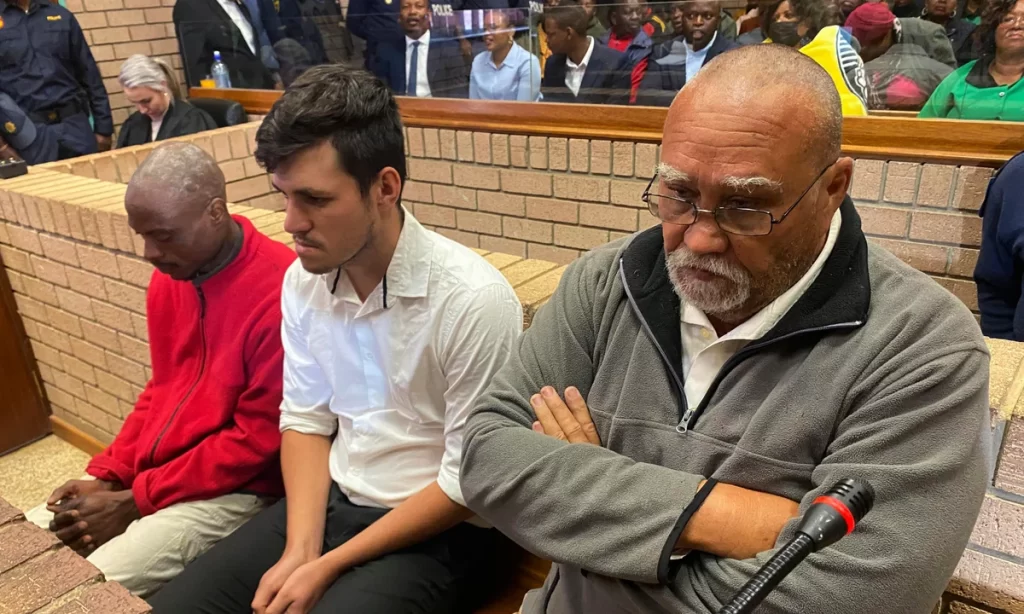Outrage over farmer accused of feeding women to pigs
3 min read

The shocking case of two Black women allegedly shot and fed to pigs by a white farmer and two of his employees has ignited outrage across South Africa. Maria Makgato, 45, and Lucia Ndlovu, 34, were reportedly searching for food on a farm near Polokwane in Limpopo province when they were killed in August. Their bodies were subsequently believed to have been disposed of in an attempt to eliminate evidence of the crime.
As the court prepares to determine whether to grant bail to farm owner Zachariah Johannes Olivier, 60, and his workers Adrian de Wet, 19, and William Musora, 50, tensions remain high. The three men have yet to enter a plea, which will be addressed during the upcoming trial. Previous court sessions have seen protests outside, with demonstrators demanding that the suspects be denied bail.
Walter Mathole, brother of Maria Makgato, expressed to the BBC that the incident has intensified racial tensions between Black and white communities in South Africa. This divide is particularly pronounced in rural areas, despite the end of apartheid three decades ago. The accused also face charges of attempted murder for shooting at Ms. Ndlovu’s husband, who was with the women, as well as possession of an unlicensed firearm.
Mabutho Ncube, who survived the attack, managed to crawl away and call for help after the incident on August 17. He later reported the shooting to police, who discovered the decomposing bodies of his wife and Ms. Makgato in a pigsty days later. Mathole described a horrific scene, noting that his sister’s body had been partially consumed by the pigs.
The women had gone to the farm in search of edible food, specifically from consignments of recently expired or soon-to-expire produce that were sometimes given to the animals. The family of Ms. Makgato is devastated by her death, particularly her four sons, aged between five and 22. Ranti Makgato, her oldest son, tearfully recounted his mother’s nurturing nature, stating, “My mum died a painful death. We lacked nothing because of her.” He added that he would feel more at ease if the alleged killers were denied bail.
The Economic Freedom Fighters (EFF), a prominent opposition party, has called for the farm’s closure, emphasizing the dangers of allowing products from the establishment to reach consumers. “The EFF cannot stand by while products from this farm continue to be sold,” the party stated following the discovery of the bodies.
The South African Human Rights Commission condemned the brutal killings and urged for anti-racism dialogues to foster understanding between affected communities. Meanwhile, organizations representing predominantly white farmers have voiced concerns about feeling targeted in a country grappling with high crime rates, although statistics show no disproportionate risk to farmers compared to other groups.
This incident follows two other recent events that have heightened racial tensions in South Africa. In Mpumalanga province, a farmer and his security guard were arrested in August for allegedly murdering two men accused of sheep theft. Their bodies were reportedly burned beyond recognition, and the accused remain in custody while DNA analysis is conducted on the remains.
Another alarming case involves a 70-year-old white farmer, Christoffel Stoman, accused of running over a six-year-old boy for allegedly stealing an orange. The boy sustained severe injuries, including broken legs, and the bail hearing for Stoman is ongoing. The incident occurred while the mother and son were passing by the farm on their way to town. Eyewitnesses reported that the mother watched in horror as the farmer drove his vehicle into her child.
The National Prosecuting Authority (NPA) is opposing Stoman’s bail application, charging him with two counts of attempted murder and reckless driving. Political parties, including the African Transformation Movement and the Pan Africanist Congress, are calling for the expropriation of Stoman’s farm in light of the incident.
These tragic events illustrate the deep-seated issues surrounding race and violence in South Africa, highlighting the urgent need for dialogue and change within the community. As the court proceedings continue, many hope for justice for the victims and an end to the cycle of violence that continues to plague the nation.